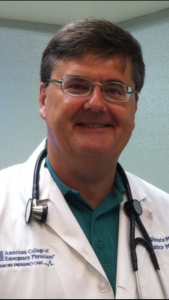ABPS Diplomate Harry L. Wingate III, MD, FACEP, On the Rural Emergency Medicine Physician Experience
 I was blessed to be a recipient of the Georgia State Medical Education Board medical school tuition grant, also known as “the country doctor program.” In exchange for the state paying my medical school tuition, I agreed to practice Primary Care (PC) medicine in an underserved GA rural community. So, in 1990 after completing my residency in Family Medicine, I moved to Eatonton, GA. While completing my PC practice obligation, I also worked for seven years in Rural EDs accumulating over 10,000 hours of experience. Seeing the tremendous need for Rural EM doctors, I decided after successfully passing the rigorous oral and written initial Board Certification in Emergency Medicine (BCEM) exams in 1997 to transition to the full-time practice of Rural Emergency Medicine (EM).
I was blessed to be a recipient of the Georgia State Medical Education Board medical school tuition grant, also known as “the country doctor program.” In exchange for the state paying my medical school tuition, I agreed to practice Primary Care (PC) medicine in an underserved GA rural community. So, in 1990 after completing my residency in Family Medicine, I moved to Eatonton, GA. While completing my PC practice obligation, I also worked for seven years in Rural EDs accumulating over 10,000 hours of experience. Seeing the tremendous need for Rural EM doctors, I decided after successfully passing the rigorous oral and written initial Board Certification in Emergency Medicine (BCEM) exams in 1997 to transition to the full-time practice of Rural Emergency Medicine (EM).
But exactly what constitutes a Rural EM practice? Many organizations, including the Centers for Medicare & Medicaid Services (CMS), the American College of Emergency Physicians® (ACEP), and the National Rural Health Association (NRHA), have examined this question. As you would imagine, they have come up with varying definitions, based on factors like geography, population density, and healthcare manpower shortage etc. But I think the most practical definition is simply this: a Rural EM practice occurs in a remotely located single-provider covered emergency department with minimal staff and with limited to no local specialty resources – a practice setting perfect for challenging the Provider’s clinical and leadership skills. This definition describes almost a third of the approximately 5000 emergency departments (EDs) in the United States.
Rural EM is, by necessity, an engaging practice setting to say the least. As someone who is competitive and easily bored, I’ve found it perfect for my personality. The 1991 movie, “Doc Hollywood” starring Michael J. Fox, gives you a good idea of quirky situations found in practicing Rural EM. In hindsight, I shouldn’t have been so surprised at how accurately the movie mirrored the people, relationships, and challenges of rural life and medicine as it’s based on a book called “What? Dead Again?” by Georgia physician Neal B. Shulman.
What I like most about practicing medicine in a rural area is the appreciation and respect I’ve received from the community. As a rural physician, you are known and esteemed as a valuable community member.
The Board of Certification in Emergency Medicine (BCEM) has played an important role in my career, opening numerous opportunities. BCEM certification gives medical staff credential’s committees and hospital administrators a quick way to know that an applicant has mastered the core principles and skills needed to practice safe, high-quality emergency medicine. While I was FM trained, going through the systematic board review process for the BCEM exam gave me a new appreciation of EM as a true and distinct specialty. It inspired me to join ACEP and become involved to advance quality care with other Emergency Physicians at the state and national level – ultimately serving as Chair of ACEP’s Section of Rural Emergency Medicine in 2010. Additionally, for the past 14 years, I have worked for Envision Healthcare Physician Services (formerly EmCare) – the depth of understanding EM and leadership skills acquired from having gone through the BCEM process have helped me advance within the organization to a Regional Director position overseeing a number of Rural EDs in GA, TN and AL. The lifestyle Emergency Medicine affords, with more free time than an office-based 5-days-a-week practice, has allowed me to pursue other passions and have more family time.
Today, rural EDs face several unique challenges, many stemming from the geography and demographics specific to rural America, concerns that have been nicely detailed by the NRHA. However, I think the biggest challenge for Rural EDs continues to be recruiting effective Site Medical Directors with EM certification, training and rural EM experience. The majority of our rural EDs are staffed by physicians/mid-levels trained in Primary Care medicine. However, an effective leader can guide their staff in the transition from a PC mindset to the EM mindset to advance a modern safe and cost-effective EM approach to patient care. Rural EM experience plus a rigorous EM Board certification process ensures the highest-quality care for our friends and families in Rural America.






